Press release – Oceans represent 70% of the Earth’s surface. They are a source of food and oxygen, and they enable climate regulation. Yet, they are under threat from plastic pollution, climate change, overfishing and destruction of marine habitats. To mark world oceans day, which will be celebrated on 8 June, GRET takes a look back at initiatives conducted with its partners in Cambodia, Senegal and Madagascar, involving local populations to protect marine ecosystems that play a crucial role in sustaining human life.
Creating a terrestrial and marine protected area in “common”
In Madagascar, GRET is defending the importance of giving citizens real power to decide and control the use and conservation of the natural resources they are surrounded and concerned by. Sainte-Marie island in Madagascar is a breeding area for humpbacked whales and has been classified by the Malagasy State as a priority protected site. Since 2015, GRET has been supporting islanders to become organised to conserve Sainte-Marie’s coastal zones. In 2020, with GRET’s support, 30,000 inhabitants started procedures to make the island a terrestrial and marine protected area. Today, the local association involved in these procedures has defined the geographic scope and rules for sustainable management of this future protected area. While legal recognition of the area is underway, the island has been placed under temporary protection and measures for ecological restoration have been taken.
Fighting plastic pollution
Every year, across the world, around eight million tons of plastic end up in oceans. In Senegal, GRET and its partners conducted an evaluation of coastal pollution to assess contamination caused by plastic and improve its recycling. In this study, the objective was also to identify malfunctions in urban waste collection services and propose actions to the population aimed at reducing the use of plastic. GRET highlighted the relevance of testing micro-plants for recycling inhabitants’ plastic. These would be situated as close as possible to collection zones, in order to optimise recycling and reduce transport costs. This initiative inspired the “Plastic Odyssey” organisation, which is currently rolling this method out across the country.
Improving essential services such as waste management
In Cambodia, development of the trade and tourism sectors is generating increased pressure on oceans. The Koh Rong archipelago in particular is undergoing significant development and neighbouring coastal zones are being developed following substantial investments by China. In 2021, GRET evaluated the impacts of the absence of waste management and waste water treatment on populations and the environment, and drew up recommendations to improve these essential services.
In conclusion, now more than ever, in the face of climate change and biodiversity loss, GRET is encouraging the necessary involvement of local populations in maintaining and restoring marine ecosystems. This participation is crucial for concerted inclusive management of territories.
About GRET:
Founded in 1976, GRET is an international solidarity NGO that works from field to political level to improve the most vulnerable populations’ living conditions and promote social justice, while conserving our planet. Its actions are underpinned by an action-research approach, co-construction with communities and the creation of a vast network of partners. Learn more at gret.org
Press contact: Marion Disdier, +33 1 70 91 92 33, disdier@gret.org

